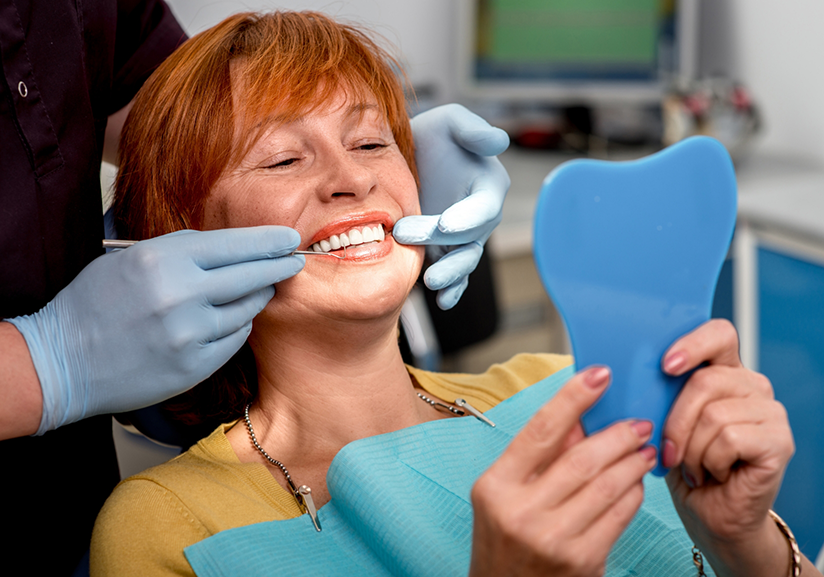Emergency Dentist Pantego
Immediate Care When You Need It Most
Emergencies are never expected. While there are things you can do to help prevent sudden dental injuries, some are unavoidable, and when they happen, we are here to help. At South Arlington Dental Care, we want to be a safe place for patients of all ages. Don’t wait to reach out – contact us right away so we can schedule an emergency appointment for you. If you’re unable to reach our office right away, we can provide guidance on how to manage your situation until our emergency dentist in Pantego, Dr. Prachi Shah, can give you the relief you need through expert care.
Why Choose South Arlington Dental Care for Emergency Dentistry?
-
Same-Day Dental Emergency Visits
-
Dentist Certified in Nitrous Oxide Sedation
-
Dental Practice That Accepts Insurance and Offers Financing
How We Treat Dental Emergencies
The treatment process varies depending on the problem you’re facing, but there is a general structure that we follow to put a stop to your pain and save your smile:
-
Schedule an Emergency Appointment: When you contact our office, we’ll ask questions to gather as much information as possible about your situation. Then we’ll set up your emergency appointment. (We’ll try to schedule it on the same day as your call whenever we can.)
-
Perform a Thorough Examination: We’ll need to learn more about your specific dental issue before we can treat it. During our emergency examination, we may take X-rays to help us identify the source of the problem.
-
Review Our Findings: We’ll explain what we found during our examination and make sure that you understand the exact nature of your emergency. Then we’ll review your options for treatment.
-
Treat Your Smile: We’ll tailor your treatment plan according to the nature of your dental emergency and how severe it is. For example, we might treat an infected tooth with root canal therapy.
The Most Common Dental Emergencies
Knowing if an injury is worth a visit to the dentist isn’t always easy. Should you experience any problems, it’s always best to err on the side of caution and call to speak to a member of our team. After evaluating the situation, they can determine if you should get in right away or wait to see if the symptoms subside. Below are some of the most common emergencies that our team deals with.
Keys to Preventing Dental Emergencies
Making good oral health decisions can lower the odds of a dental emergency occurring. Here are some good habits to practice:
-
Remember to brush two times a day and floss daily. Consider setting a reminder on your phone so that you don’t forget.
-
Eat fewer foods that are high in sugar and starch.
-
Wear a nightguard when you go to bed. This helps stop your teeth from becoming worn down due to bruxism.
-
Visit our office for routine checkups and cleanings. You should plan to visit the dentist twice every year.
Understanding the Cost of Dental Emergencies
At South Arlington Dental Care, we are pleased to welcome your dental insurance and will file all necessary paperwork and claims forms. If you are uninsured, or if your out-of-pocket expenses are still too much for you to pay at one time, we do offer financing with CareCredit, Cherry, and Sunbit, which will allow you to enroll in a low-interest or no-interest payment plan.
Finally, our office does provide a VIP Savings Plan for patients who wish to pay a single fee each year for services.
No matter the cost of treating your dental emergency, we can identify a plan that will help you stay within your budget while getting the care you need.
Frequently Asked Questions
How do I know if I’m having a dental emergency?
When trying to determine if the problem you’re experiencing is, in fact, a dental emergency, there are a few ways you can tell, such as if you’re bleeding, you’re experiencing swelling, or you’ve fractured, chipped, or broken a tooth. It’s always best to err on the side of caution when dealing with injuries that are related to your teeth, gums, or facial structure. These types of injuries do not heal on their own, so when they occur, it’s in your best interest to contact our office and alert us to the issue. We will be happy to walk you through the steps to take while at home, and we’ll quickly schedule an appointment.
What can I take to help with tooth pain?
Toothaches can be very annoying. The throbbing and aching pain radiating through your mouth can make your neck and shoulders tense up, and your head might start to hurt as well. Before we can see you in our office, there are a few things you can do to manage tooth pain at home, including:
-
Gargling with a salt and hot water mixture to reduce irritation and aching.
-
Using a cold compress or ice pack to reduce swelling and alleviate pain.
-
Gargling with hydrogen peroxide and water.
-
Using a cotton ball soaked in apple cider vinegar to help with swelling and discomfort.
How do I remove an object that’s stuck in my teeth?
The best way to remove something that is stuck between your teeth is with dental floss. The key is to carefully move the floss back and forth between your teeth to dislodge the object. If that doesn’t work, a water flosser might be able to help.
Remember, never use tools such as pliers, forks, knives, tweezers, or any other sharp object to remove a stuck item, as they can do much more harm to your teeth and gums.
How long does a toothache last?
This answer mostly depends on what is causing the toothache. If your pain lasts longer than 1-2 days, you should seek treatment right away. If there is something stuck between your teeth and you can dislodge it, you should experience relief almost immediately; however, if there is a more harmful underlying problem such as an infection, the pain will likely continue until treatment is administered.
Never underestimate a toothache. While you might think it will go away on its own, it may not, which is why timely care is important to protect your overall oral health.
Should I go to the emergency room?
This is a question asked by many patients who have experienced a dental emergency. A dental professional will often be able to effectively handle your situation and recommend treatment options. However, if you are suffering from continual bleeding, swelling, or a fractured or broken jaw, you should get to your local emergency room as soon as possible.
Toothaches
Is my toothache a dental emergency? Many patients believe they can wait out a toothache, but issues like cracks, decay, and damage don't heal on their own. Delayed contact with our team in Pantego allows the underlying problem to progress. We strongly advise reaching out quickly to prevent further complications.
How you should handle a toothache: If dealing with a toothache at home, take proactive measures to protect your tooth. Stick to soft foods, use a cold compress on your cheek for 10-minute intervals, maintain a solid oral hygiene routine, and periodically rinse with warm saltwater.
How we treat toothaches: When you get to our office, we’ll conduct X-rays and an exam to help us identify the source of your discomfort and determine the best intervention. We may recommend treatment options like a tooth-colored filling or root canal depending on your unique dental needs.
Learn More About Root Canal Treatment
Chipped Tooth
Is a chipped tooth a dental emergency? It depends. If the chip causes significant pain, it's crucial to contact our team immediately. However, if it's a minor chip and you're not in acute pain, waiting a day or two for an appointment should be safe.
How you should handle a chipped tooth: Besides reaching out to our team, stick to soft foods, avoid hot drinks, and rinse your mouth thoroughly with clean, lukewarm water. If the chip creates a sharp edge, use dental wax or sugar-free gum to cover it.
How we treat chipped teeth: For minor chips, direct bonding is a cost-effective, single-visit option with lifelike results. In more severe cases, veneers may be recommended, offering longer-lasting results despite a larger initial investment.
Learn More About Veneers
Cracked Tooth
Is a cracked tooth a dental emergency? Absolutely! This dental injury often requires immediate attention to prevent infection or further breakdown. Visiting our emergency dentist in Pantego on the same day is crucial for optimal care.
How you should handle a cracked tooth: Protecting your tooth from additional damage is a priority. Refrain from chewing on that side of your mouth, and periodically rinse with clean, lukewarm water. If experiencing significant pain, consider using an over-the-counter pain reliever.
How we treat cracked teeth: The recommended treatment option depends on the severity of the damage. For minor cracks where the tooth can be saved, a dental crown is a suitable option. In cases where saving the tooth isn't possible, extraction followed by a dental bridge or implant may be necessary.
Very Sensitive Teeth
Are Very Sensitive Teeth a Dental Emergency? Sometimes! For example, if you have a blister on your gums or it hurts to bite down, you should visit our emergency dentist in Pantego right away.
How You Should Handle Very Sensitive Teeth: There’s only one thing you can do from home: try to avoid exacerbating your discomfort. So, don’t drink anything hot or eat anything cold. If you’re experiencing considerable sensitivity, then you can also take OTC pain medication as a short-term solution.
How We Treat Very Sensitive Teeth: To alleviate your dental sensitivity, we need to determine what’s causing it! That’s why we need to take X-rays and examine your teeth and gums before providing you with our treatment recommendations.
Learn More About Root Canal Treatment
Knocked-Out Tooth
Is My Knocked-Out Tooth a Dental Emergency? Yes, because each minute that goes by, our chances of being able to save your tooth decreases. So, whether you fell while riding your bike or your tooth got knocked out on the football field, don’t wait – call our Pantego dental team ASAP to schedule an appointment.
How You Should Handle a Knocked-Out Tooth: First, do your best to find your tooth. If you can locate it, then you need to take a few measures to preserve the root. After rinsing the tooth with water to remove any dirt, you can submerge it in a container filled with milk or carefully insert it back into the socket.
How We Treat Knocked-Out Teeth: If you get to our office within the hour and your tooth is in good condition, then there’s a chance that we can save it. If that’s not an option, don’t worry – we can fill the open space with a dental bridge or implant.
Learn More About Dental Implants
Lost Filling or Crown
Is a Lost Filling or Crown a Dental Emergency? Yes – whether you lost a small dental filling or an entire dental crown – you should call us ASAP to schedule an appointment with our Pantego emergency dentist.
How You Should Handle a Lost Filling or Crown: In addition to rinsing your mouth periodically with clean, room-temperature water and not chewing on that side of your mouth, you should store your restoration somewhere safe and bring it with you to your appointment.
How We Treat Lost Fillings or Crowns: Fillings are simple to replace, which is why we often just provide our patients with a new one. Dental crowns, on the other hand, are a bit more complex since they are custom-made. If your existing dental crown is in good condition, then we may be able to restore your smile by re-cementing it back in place. Or, we will need to have a new one made.
Broken Denture
Is My Broken Denture a Dental Emergency? Whether your denture has a small hairline crack, or it has shattered into several pieces, calling our Pantego dental team should be a priority. That way, we can start the process of repairing or replacing it right away.
How You Should Handle a Broken Denture: We don’t recommend wearing your broken denture since it can lead to soft tissue irritation as well as further damage. Instead, put it somewhere safe, like a small, clean container, and get to our office as soon as you can.
How We Treat Broken Dentures: Sometimes, broken dentures can be repaired at our office. Of course, if your restoration has split into several pieces, then that won’t be possible. Instead, we will need to start the process of having a new traditional denture or implant denture made.
Learn More About Dentures
Learn More About Dental Implants
Loose Permanent Tooth
Is a Loose Permanent Tooth a Dental Emergency? Since the tooth is at risk of falling out or, at the very least, developing an infection, the answer is “yes!” We strongly recommend reaching out to us as soon as you realize that it’s loose, even if it seems minor.
How You Should Handle Loose Permanent Teeth: Getting to our office for treatment is a top priority. If you have a few hours until your appointment, then do not chew on that side of your mouth, do not wiggle or touch the tooth with your tongue or finger, and rinse your mouth with clean, lukewarm water.
How We Treat Loose Permanent Teeth: There are some cases where our only choice is to remove your tooth and put a dental bridge or implant in its place. Fortunately, there are other cases where we can help the tooth heal back in place with a dental splint.
Learn More About Dental Implants
Injury to the Gums, Lips, or Tongue
Is an Injury to the Gums, Lips, or Tongue a Dental Emergency? If you’re experiencing severe bleeding that doesn’t stop even after applying pressure for 10 minutes, then it does require medical attention. So, call 911 or head to the ER right away.
How You Should Handle an Injury to the Gums, Lips, or Tongue: Fortunately, many soft tissue injuries can be handled at home with two things: clean water and a damp washcloth. Simply rinse the cut thoroughly with clean water and use the damp washcloth to apply pressure to the area.
How We Treat Injuries to the Gums, Lips, or Tongue: Usually, soft tissue injuries are severe enough that they warrant a visit to the ER or minor enough that they can be handled at home. With that said, you’re always welcome to give us a call if you’re unsure what to do.
Jaw Pain
Is Jaw Pain a Dental Emergency? Jaw pain does warrant an immediate call to our Pantego dental team if it has persisted for more than 24 hours, it makes it difficult to chew, or it’s negatively impacting your quality of life in another way.
How You Should Handle Jaw Pain: A few short-term ways to alleviate jaw pain include: using a cold compress for 10 minutes at a time, sticking to soft foods, and taking OTC pain medication as directed. For long-term relief, you need to come in for treatment.
How We Treat Jaw Pain: That depends! If your jaw pain stems from impacted wisdom teeth, then we will recommend that you have them removed. If your jaw pain stems from chronic teeth grinding, then the solution may simply be a custom nightguard!
Something Stuck Between the Teeth
Let’s start with what you shouldn’t do: use tweezers, a toothpick, or another sharp object to try and remove the debris (this has the potential to push it further into your gums!). Instead, rinse your mouth thoroughly with a mixture of salt and warm water. Then, use your floss of choice to gently clean between your teeth.




